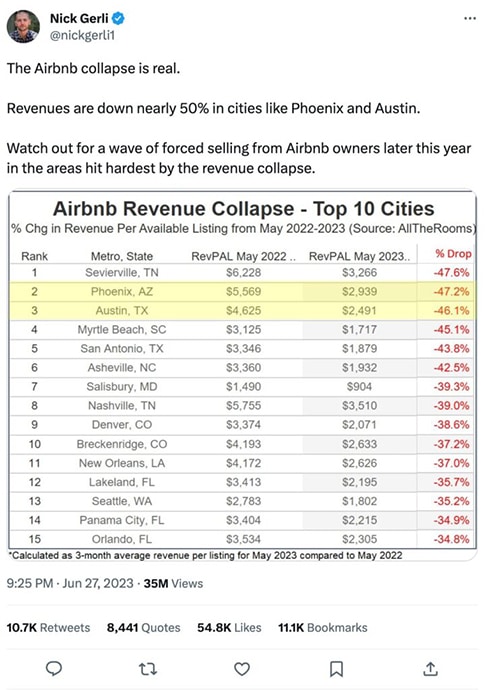Welcome to The WC and Happy Independence Day to those who celebrated.
Today we’ve got five useful and interesting things others aren’t talking about.
This week is a bit drier higher brow than usual. Let me know what you think.
We’re always looking for new fans. If you like what you read here, forward it on.
Wyatt
Table of Contents
A Sharia-compliant solution for Bitcoin
Back in the day, I helped my soulless bank develop a Sharia-compliant corporate banking solution. The bank was expanding its presence in the Muslim world, and Islam was expanding its influence in my company’s home market.
So what is Islamic finance?
- Islamic finance is a financial system rooted in Islamic principles that prohibits interest (riba) and promotes risk-sharing and ethical investments.
- It emphasizes the concept of justice and fairness in financial transactions, aiming to create an equitable distribution of wealth and promote socio-economic development.
There are a variety if Sharia-compliant investment vehicles that mimic or replace western mortgages and trade finance, for example.
All in all, it’s a system that’s fairly difficult to argue against, at least from a principles point of view. Who doesn’t want justice and fairness in financial transactions?
Now there’s a Sharia-compliant Bitcoin alternative called Islamic coin, and it’s raised $400 million.
With around two billion Muslims worldwide, this is a very big deal, and it could open crypto and web3 technologies to a vast swath of the population that was previously underserved.
If you want to learn more, Stefan wrote about Islamic Finance last year.
How I learned to stop worrying and love AI
There’s been a lot of hand-wringing about how AI is going to take your job, your friend’s job, your cousin’s job, and everyone else’s job, and soon there will be no more jobs left. We’ll all be drooling semi-sentient blogs living off whatever meagre allowance our robot overlords deem sufficient.
So much has been written that it seems a bit late in the day to talk about this. It’s been done to death.
But I want to present two arguments that demonstrate that while specific jobs or workers may be at risk, society as a whole is fine (on this vector anyway).
The always excellent Benedict Evans covers this much more deeply and thoughtfully than I could, but here’s the gist.
Every time we go through a wave of automation, whole classes of jobs go away, but new classes of jobs get created. There is frictional pain and dislocation in that process, and sometimes the new jobs go to different people in different places, but over time the total number of jobs doesn’t go down, and we have all become more prosperous.
We can see the jobs that are going away, but we can’t predict what the new jobs will be, and often they don’t exist yet.
And he backs this up with two economic principles that prove this out.
First is the Lump of Labour fallacy. “The Lump of Labour fallacy is the misconception that there is a fixed amount of work to be done, and that if some work is taken by a machine then there will be less work for people.”
And this is demonstrably not true. More free time or money in the bank leads to more time and space for other needs. Those needs to be met by increased resource allocation. Labour moves.
Second, Jevons Paradox contradicts the idea that a more efficient resource means we’ll need less of it. “If, Jevons tells us, it becomes much cheaper and more efficient to do something, you might do more of it – you might do more analysis or manage more inventory. You might build a different and more efficient business that is only possible because you can automate its administration with typewriters and adding machines.”
All bets are off when / if AGI — artificial general intelligence — becomes a thing. A super computer that can wholly replicate everything people can do — and do a better job of it — is different. But we’re a long way from there.
Residential real estate report card
So, real estate. That’s a wild one. Despite soaring mortgage rates, the median home sold June 2023 was only 2.5% lower than it was a year earlier.

Realtor.com has put together a mid-year report card for 2023. Here are the highlights (lowlights):
- Home sales are expected to come in around 4.2 million for 2023, down from 5 million last year.
- More than 4 in 5 home shoppers (82%) report feeling locked-in by their existing low-rate mortgage.
- While prices and sale values are cratering in the west, they’re flat to up everywhere else.
- Someone buying a home today will pay 10.5% more in mortgage payments vs buying a year ago.
- Because the market is less competitive, the size of down payments has decreased.
- Because fewer people are buying homes, the rental market has stayed strong. That may not last, though, with the introduction of 450k new multifamily home units and a potential collapse in the STR market (see below).
On paper, the real estate price crash hasn’t materialised despite lots of doom and gloom predictions. Prices are steady, which feels encouraging, but it’s really the only positive metric for homeowners.
And…that positive metric is driven by the second point above — there’s no liquidity in the market.
Further, things are probably going to be worse than the forecasts above predict.
Realtor.com isn’t exactly an unbiased news source — they make money when people buy and sell homes. They’ve also got a wide variety of paid-for products for realtors. So their incentive is to keep realtors optimistic.
Time for an Airbnb cras?
Let’s stick with real estate for a moment (themes!). A viral thread last week painted a very doomy and gloomy story about the market for AirBnb hosts.
The first thing to say here is that several people disagreed with the data, and info from other sources paints a very different picture. So, again, big grain of salt.
Assuming this is accurate (or at least directionally correct and in the ballpark), there are some big implications here.
First, there are nearly 1 million Airbnb / VRBO homes in the US compared to around 570k currently for sale. A forced sale of any meaningful percent of these STR properties adds immediate liquidity and downward price pressure to the market.
Second, both Austin and Phoenix are already off their highs by around 10%. Seattle is off 8%. And none of these metros show any sign of decelerating losses. Add in this new inventory, and the bottom could fall out of the market completely. In Phoenix, for example, there are 18k STRs against only 8k homes on the market.
Third, if these owners choose to convert the home to a long-term rental instead of selling into a declining market, that’s going to push rents down significantly in these areas. Good news for tenants but bad for landlords.
So what does all this mean if you’re a real estate investor? Assuming the data and my analysis are both correct?
Well it means that a lot of residential retail markets have a lot lower to go before bottoming out. Don’t try to catch falling knives.
It also means Airbnb prices will go up as excess inventory sells off.
I’m watching Phoenix, Austin, and Orlando specifically as they fall. These type of markets are the most volatile in choppy markets. Catching a bottom late this year or in 2024 could pay off when the market recovers.
Finally, if you’re into equities, this sort of decline in host revenue will flow through to $ABNB’s top line within a quarter or two.
Sticking it to the man, Civil War style
Diamond Jim Fisk was a robber baron in the late 19th century. His entire story is compelling, but check out this twitter thread for a particularly impressive anecdote.
Here’s the gist:
Jim Fisk devised a plan to short Confederate bonds in London before news of the Civil War’s end reached the city. He employed a faster vessel to race across the Atlantic with the news, and bribed a telegraph operator to send a signal to his associate in Halifax. Hargreaves was able to sell $5 million worth of Confederate bonds before news reached Reuter, and the 14th Amendment declared all such debts illegal and void.
Bonus!
Took a bonus break last week due to family commitments. Here’s the good stuff you’ve been waiting for.
What I’m watching
The Menu – It’s like Parasite except funny and about food. Best thing I’ve seen in awhile.
What I’m wondering
Is there an affiliate solution for podcasts? That is, if a publisher or influencer sends a podcast new subscribers, can they get paid for it? This exists for newsletters and countless other forms of media already.
That’s all for this week; I hope you enjoyed it.
Cheers,
Wyatt
Disclosures
- This issue was sponsored by Diamond Standard and House of Rare
- Our ALTS 1 Fund has invested in Diamond Standard and House of Rare
- Should we start a podcast? It seems hard.













